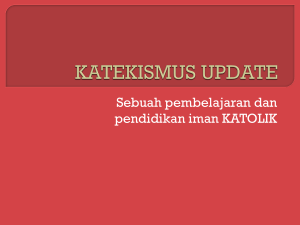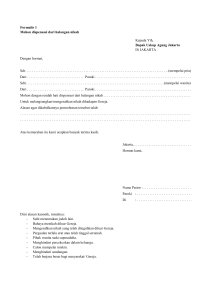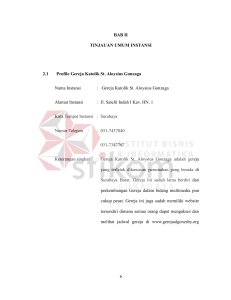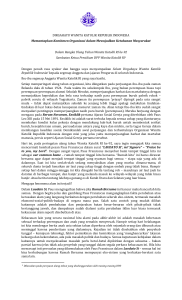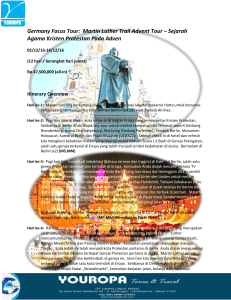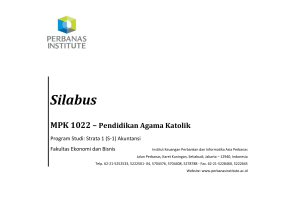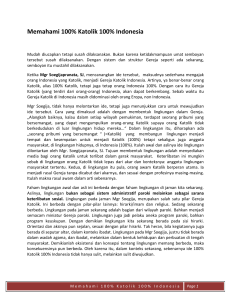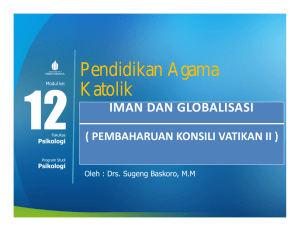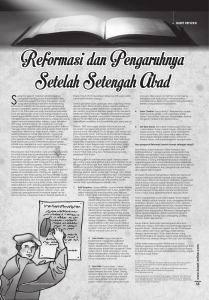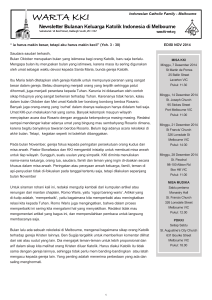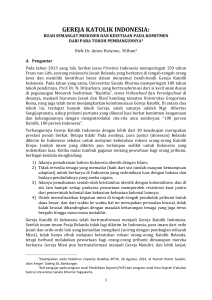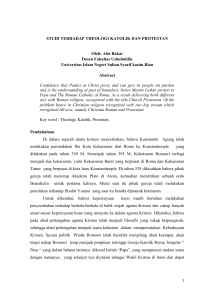plagiat merupakan tindakan tidak terpuji
advertisement
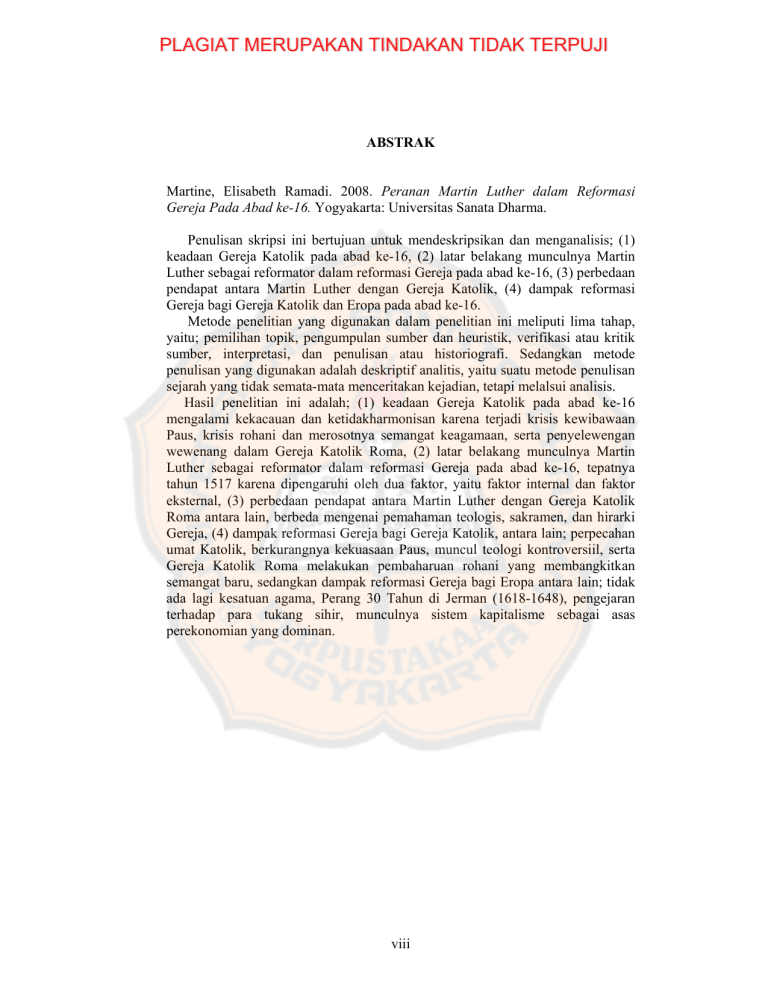
PLAGIAT MERUPAKAN TINDAKAN TIDAK TERPUJI ABSTRAK Martine, Elisabeth Ramadi. 2008. Peranan Martin Luther dalam Reformasi Gereja Pada Abad ke-16. Yogyakarta: Universitas Sanata Dharma. Penulisan skripsi ini bertujuan untuk mendeskripsikan dan menganalisis; (1) keadaan Gereja Katolik pada abad ke-16, (2) latar belakang munculnya Martin Luther sebagai reformator dalam reformasi Gereja pada abad ke-16, (3) perbedaan pendapat antara Martin Luther dengan Gereja Katolik, (4) dampak reformasi Gereja bagi Gereja Katolik dan Eropa pada abad ke-16. Metode penelitian yang digunakan dalam penelitian ini meliputi lima tahap, yaitu; pemilihan topik, pengumpulan sumber dan heuristik, verifikasi atau kritik sumber, interpretasi, dan penulisan atau historiografi. Sedangkan metode penulisan yang digunakan adalah deskriptif analitis, yaitu suatu metode penulisan sejarah yang tidak semata-mata menceritakan kejadian, tetapi melalsui analisis. Hasil penelitian ini adalah; (1) keadaan Gereja Katolik pada abad ke-16 mengalami kekacauan dan ketidakharmonisan karena terjadi krisis kewibawaan Paus, krisis rohani dan merosotnya semangat keagamaan, serta penyelewengan wewenang dalam Gereja Katolik Roma, (2) latar belakang munculnya Martin Luther sebagai reformator dalam reformasi Gereja pada abad ke-16, tepatnya tahun 1517 karena dipengaruhi oleh dua faktor, yaitu faktor internal dan faktor eksternal, (3) perbedaan pendapat antara Martin Luther dengan Gereja Katolik Roma antara lain, berbeda mengenai pemahaman teologis, sakramen, dan hirarki Gereja, (4) dampak reformasi Gereja bagi Gereja Katolik, antara lain; perpecahan umat Katolik, berkurangnya kekuasaan Paus, muncul teologi kontroversiil, serta Gereja Katolik Roma melakukan pembaharuan rohani yang membangkitkan semangat baru, sedangkan dampak reformasi Gereja bagi Eropa antara lain; tidak ada lagi kesatuan agama, Perang 30 Tahun di Jerman (1618-1648), pengejaran terhadap para tukang sihir, munculnya sistem kapitalisme sebagai asas perekonomian yang dominan. viii PLAGIAT MERUPAKAN TINDAKAN TIDAK TERPUJI ABSTRACT Martine, Elisabeth Ramadi. 2008. The Role of Marten Luther in the Church Reformation in 16th Century. Yogyakarta: Sanata Dharma University. The aim of this paper is giving a description and analysis of: (1) the condition of the church in 16th century, (2) the background of Martin Luther’s as a reformer in the reformation of the church in 16th century, (3) the differences of opinions between Martin Luther and the Catholic Church, (4) the impact of the reformation on the Catholic Church and Europe in 16th century. The research method used in this research covers five stages; topic selection, sources and heuristic gathering, verification or critics of sources, interpretation, and writing process or historiography. Whereas the methods of writing used are descriptive analytical method, a historical writing method which both tell the occurrences and analysis them. The result of the research are: (1) in 16th century, the Catholic Church was in a disharmonious and chaotic condition because of a number of crises in the Pope’s authority, spiritual, and descend of religiosity spirit, besides the authority abuse in the Rome Catholic Church; (2) Martin Luther’s uprising as a reformer in the Church reformation in 16th century, in 1517 precisely, was influenced by two circumstances, external and internal factors; (3) there are different opinions between Martin Luther and the Rome Catholic Church in theological concepts, sacraments, and hierarchy Church; (4) the impacts of Church Reformation on the Catholic Church were the division in Catholic believers, the decline of the Pope’s authority, the emerge of a controversial theology, and renewal in Catholic Church which emerges new spirit; while the impacts of Church reform for Europe are that there is any longer religion uniformity, 30 year war in Germany (1618 – 1648), chasing for witches and the emerge of capitalism as a dominant economic principle. ix
